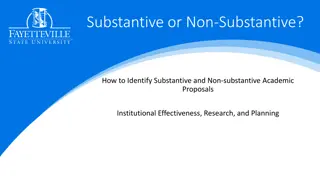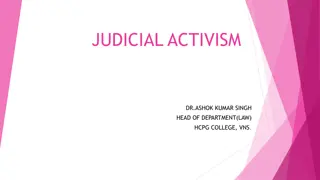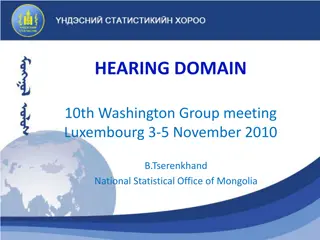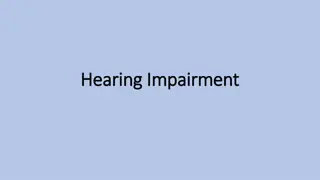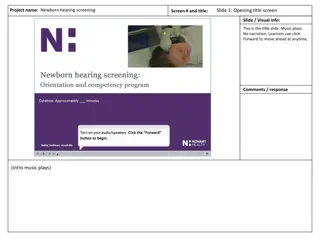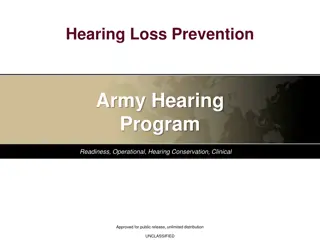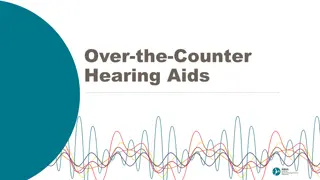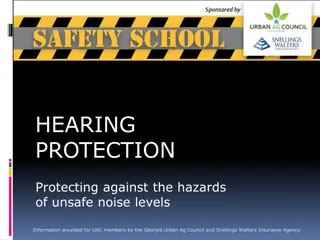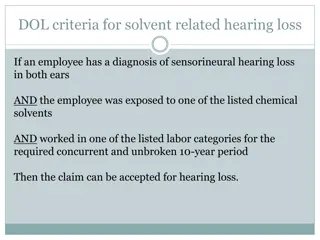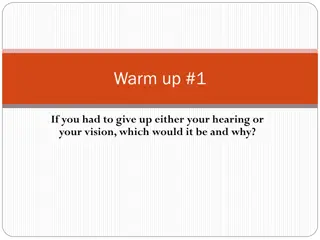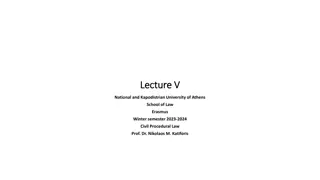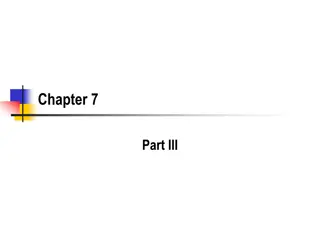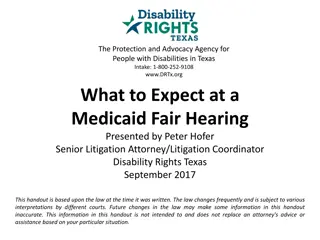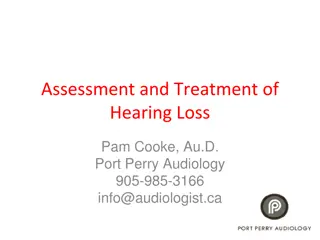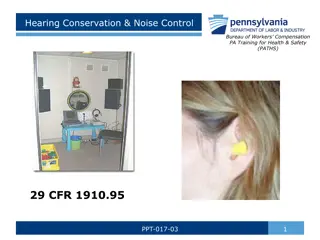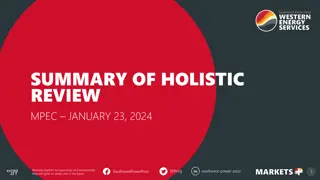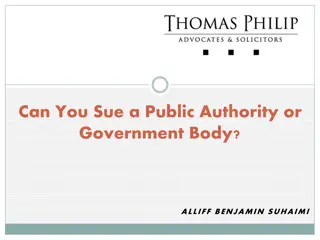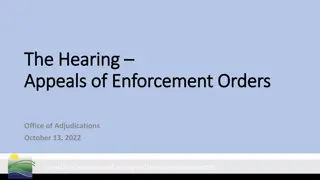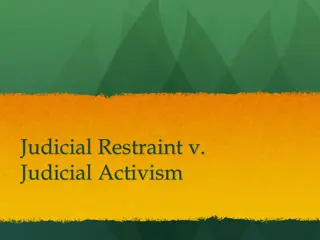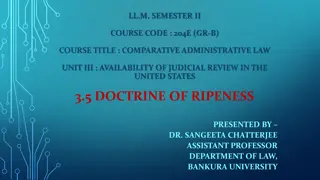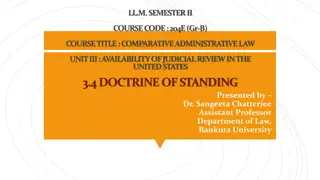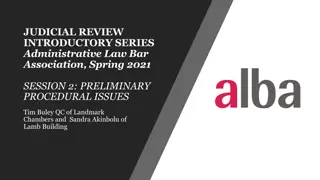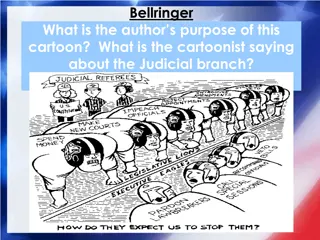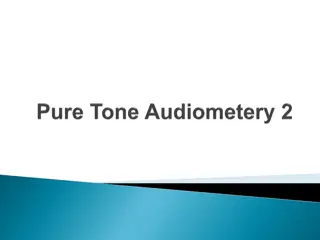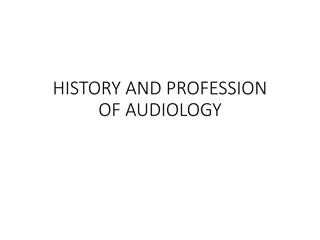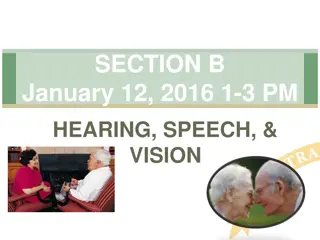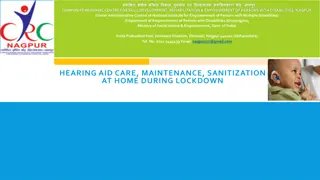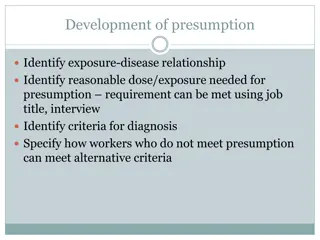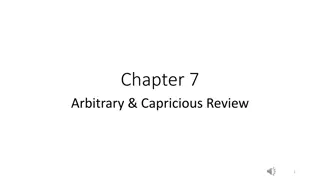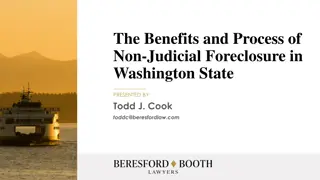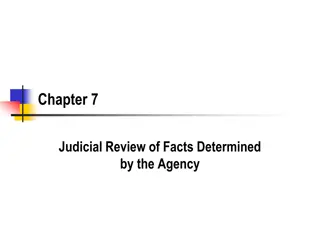Overview of Judicial Review Preparation for Substantive Hearing
Post-permission steps in judicial review cases involve various crucial aspects such as interim applications, evidence disclosure, preparation for hearing, and post-hearing procedures. This includes payment of fees, filing of defense grounds and evidence, scheduling, exchange of arguments, and compliance with standard directions. The process requires careful consideration of complex matters and may involve amendments with proper permissions. Additionally, interim applications may necessitate serving evidence and potential amendments to the case with clear notice to all parties involved.
Uploaded on Oct 04, 2024 | 0 Views
Download Presentation

Please find below an Image/Link to download the presentation.
The content on the website is provided AS IS for your information and personal use only. It may not be sold, licensed, or shared on other websites without obtaining consent from the author. Download presentation by click this link. If you encounter any issues during the download, it is possible that the publisher has removed the file from their server.
E N D
Presentation Transcript
ALBA INTRODUCTION TO JUDICIAL REVIEW PREPARATION FOR THE SUBSTANTIVE HEARING Martin Westgate QC Leonie Hirst Doughty Street Chambers www.doughtystreet.co.uk | 020 7404 1313 | enquiries@doughtystreet.co.uk
Overview Post-permission steps: directions and matters to consider Interim applications: Evidence Disclosure and RFIs Interim relief Preparation for hearing Hearing Post-hearing: appeals and costs www.doughtystreet.co.uk | 020 7404 1313 | enquiries@doughtystreet.co.uk
What happens following permission? All judicial reviews: payment of continuation fee, filing of detailed grounds of defence and evidence, listing, exchange of skeleton arguments, hearing Standard directions: DGDs within 35 days, any reply within 14 days, listing with time estimate, exchange of skeleton arguments (Claimant skeleton 21 days prior to hearing, D 14 days), agreed hearing bundle, agreed authorities Directions require careful consideration: if complex matter, court may direct not suitable for DHCJ, or suitable for Divisional Court Listing: if expedition needed, should be sought at or shortly after permission. Don t abuse urgent listings procedure! Claimant s reply to DGD not explicit in CPR 54 but increasingly common, permission to file reply and any additional evidence should be requested in directions www.doughtystreet.co.uk | 020 7404 1313 | enquiries@doughtystreet.co.uk
Interim applications - evidence D s evidence normally served with DGDs Not normally necessary for C to file evidence in response, but may be prudent to preserve opportunity for C to do this in directions order Permission required for expert evidence: CPR 35.4 applies (although seldom reasonably required in judicial review proceedings) Applications to rely on further evidence normally dealt with by consent www.doughtystreet.co.uk | 020 7404 1313 | enquiries@doughtystreet.co.uk
Interim applications amendment to case May be necessary to amend C s case if (i) matters arising from DGDs and evidence, and/or (ii) if new decision taken C must seek permission to rely on grounds other than those on which permission was granted must be at least 7 clear days notice to court and other parties before the hearing date Application with amended/supplementary grounds (tracked changes) Requirement for permission to amend post-service also applies in Upper Tribunal JR: Spahiu [2019] WLR 1297 If seeking to argue ground where permission refused at oral hearing, should normally appeal to CA but Administrative Court may in exceptional circumstances permit C to argue (e.g. if there has been a significant change of circumstances or law rendering it arguable) www.doughtystreet.co.uk | 020 7404 1313 | enquiries@doughtystreet.co.uk
Fresh decision: rolling judicial review The moving target : the problem of balancing procedural flexibility with procedural rigour Renewed emphasis on procedural rigour , and trend towards rolling judicial review deprecated: R (Dolan) v Secretary of State for Health and Social Care [2020] EWHC 1786 (Admin) Where D has agreed to reconsider the decision, usually appropriate to end claim rather than staying or seeking to amend the claim: R (Bhatti) v Bury MBC [2013] EWHC 3093 But no hard and fast rule: see discussion and principles in R (Raja and Hussain) v LB Redbridge [2020] EWHC 1456 (Admin) at [18-21] Court must ensure sufficient flexibility to secure the interests of justice and fairness to the parties www.doughtystreet.co.uk | 020 7404 1313 | enquiries@doughtystreet.co.uk
Interim applications disclosure Disclosure distinct to duty of candour, which applies to both parties at all stages of judicial review claim CPR Part 31 applies but CPR PD 54.12: disclosure is not required unless the court orders otherwise Formerly, approach to disclosure in judicial review was very restrictive: only ordered where evidence shown to be materially inaccurate or misleading Now, disclosure will be ordered where necessary in order to resolve the matter fairly and justly , but must be focused on the legality of the decision under challenge: R (Bredenkamp) v FCO [2013] EWHC Admin 2480 Court may order disclosure of confidential documents or order a gist to be disclosed May be necessary to make decision under challenge intelligible, or to enable effective cross- examination: Al-Sweady www.doughtystreet.co.uk | 020 7404 1313 | enquiries@doughtystreet.co.uk
Requests for further information Part 18 CPR 18: court may require a party to clarify any matter which is in dispute in the proceedings or give additional information in relation to any such matter whether or not the matter is contained or referred to in any case Can be used to clarify and narrow issues in dispute ahead of substantive hearing In judicial review, Part 18 acts as backup to duty of candour: has traditionally been seen as exceptional (Bredenkamp) but increasingly used Should make formal request setting out information sought, before seeking an order from the court Ensure that requests are focused on relevant information/documents and not a fishing expedition ! www.doughtystreet.co.uk | 020 7404 1313 | enquiries@doughtystreet.co.uk
Interim applications cross-examination Extremely rare in judicial review proceedings, but may be permitted especially in claims involving hard-edged factual issues: R (Al-Sweady) v Secretary of State [2010] HRLR 2 Only where cross-examination is necessary to deal with case fairly and justly : R (St Matthews (West) Ltd) v HM Treasury [2014] EWHC 2426 Consider whether necessary / will assist the court in determining fact-dense issues: R (NB & Ors) v SSHD [2021] EWHC 1489 www.doughtystreet.co.uk | 020 7404 1313 | enquiries@doughtystreet.co.uk
Interim relief Need for procedural rigour: AC JR Guide 2021 Should first seek to obtain agreement of other party to the form of order Delay may weigh against granting of order sought Wherever possible court will seek written / oral response from D (unless irreversible prejudice to C in meantime) Claimant s duty of candour ( full and frank disclosure ) and enhanced burden in without notice applications Consider whether urgency really needed and do not abuse urgent application procedure: R(DVP) v SSHD [2021] 606 (Admin) American Cyanamid principles Note more stringent approach needed where interim relief will effectively dispose of the claim: R (Detention Action) v SSHD [2020] EWHC 732 (Admin) Mandatory relief: requires a strong prima faciecase but depends on context Considering prospect of success at trial and balance of convenience must take into account consideration of public interest www.doughtystreet.co.uk | 020 7404 1313 | enquiries@doughtystreet.co.uk
Interim applications procedure Part 23 application notice (N244) supported by evidence (witness statement) and draft order Application notice and draft order must usually be served on other party Be realistic about relief sought and whether inter partes hearing required If inter partes hearing required, skeleton argument should be produced at least 2 days before the hearing www.doughtystreet.co.uk | 020 7404 1313 | enquiries@doughtystreet.co.uk
Listing Listing policy: http://www.justice.gov.uk/courts/rcj-rolls-building/administrative- court/listing-policy Covid-19 arrangements for remote hearings: https://assets.publishing.service.gov.uk/government/uploads/system/uploads/attachm ent_data/file/939155/RCJ_Administrative_Court_Information_for_Court_Users_30_Nov.p df Court will normally contact parties before hearing to ascertain preferred mode of hearing; must inform court if cannot attend due to illness/self-isolation Daily cause lists at https://www.gov.uk/government/publications/administrative-court- daily-cause-lists (updated around 3pm daily) Parties must be realistic about (and attempt to agree) time estimates and running order. Do not forget reading time! www.doughtystreet.co.uk | 020 7404 1313 | enquiries@doughtystreet.co.uk
Settlement and withdrawal Duty on parties to consider settlement throughout the case Unreasonable failure to mediate may sound in costs Where settlement reached, parties must file a draft consent order which requires application and fee (ACG 22.4) Where agreement that court should do a judicial act e.g. quashing decision, then parties must agree a statement of reasons why that order is merited Where not possible to agree how costs should be determined, may provide for written submissions on the issue of costs Settlement on behalf of child or protected party requires court approval (ACG 23.5 and CPR 21) Must inform the court promptly if case likely to settle Claim may be withdrawn/discontinued at any time, but C must pay D s costs unless court orders otherwise. Withdrawal in UT JR requires permission of the Tribunal www.doughtystreet.co.uk | 020 7404 1313 | enquiries@doughtystreet.co.uk
Preparation for the hearing - bundles PD54A.16, ACG 18 Must be lodged at same time as skeleton argument (or earlier if directed by Court) Until further order must be in electronic form not exceeding 20MB, hyperlinked and comply with guidance at https://assets.publishing.service.gov.uk/government/uploads/system/uploads/attachm ent_data/file/939155/RCJ_Administrative_Court_Information_for_Court_Users_30_Nov.p df Must be in chronological order, be paginated sequentially and indexed, and double- sided If >500 pages consider core + supplementary bundle Also need an agreed authorities bundle limit it to authorities which are really necessary (see ACG 10 authorities) www.doughtystreet.co.uk | 020 7404 1313 | enquiries@doughtystreet.co.uk
Preparation for the hearing skeleton arguments CPR PD 54A: C skeleton 21 working days before hearing, D 14 working days. Must contain: Time estimate for hearing List of issues Chronology of events Essential reading list and time estimate List of persons referred to Must be concise see comments in Dolan at [119-120] about documents which conceal rather than illuminate the essence of the case being advanced Should always be referenced to hearing bundle Citation of authorities should follow Practice Direction [2001] 1 WLR 1001: avoid lengthy quotes from cases or statutes Consider whether to pursue all grounds of claim and make it clear if ground is not pursued Focus on decision challenged and relief sought www.doughtystreet.co.uk | 020 7404 1313 | enquiries@doughtystreet.co.uk
The hearing Single judge or Divisional Court (Court of Appeal judge + 1 or 2 High Court judges) Not normally listed before judge who refused permission but if so then can be basis for recusal application: R (Mohammed) v Special Adjudicator [2002] EWHC 2496 (Admin), Sengupta v Holmes [2002] EWCA Civ 1104 Manage the court s time carefully, and alert judge to any potential delay as soon as possible Judgment may be given at hearing but will normally be reserved. Draft judgment is sent to parties so that they can submit list of corrections/errors. Draft judgment is confidential and must not be disclosed in advance of handdown Counsel normally expected to agree a draft order reflecting the judgment Where damages sought, may be determined by court or case may be transferred for determination of quantum make it clear in skeleton argument whether court is expected to address damages or only liability www.doughtystreet.co.uk | 020 7404 1313 | enquiries@doughtystreet.co.uk
Appeals Court of Appeal not necessary to seek permission from the lower court but usual to do so at hand-down of judgment Permission only granted if (i) real prospect of success or (ii) some other compelling reason why the appeal should be heard 21 day time limit runs from date on which decision given, not date when order sealed can be extended by Administrative Court whether or not permission granted, if application made within 21 day period Application to Court of Appeal on N161 and must be accompanied by grounds AND skeleton argument in support www.doughtystreet.co.uk | 020 7404 1313 | enquiries@doughtystreet.co.uk
Costs Costs in judicial review dealt with within normal CPR framework applicable to private parties (CPR 44) Summary assessment, especially if case lasts <1 day: schedule of costs must be served no later than 24 hours before the hearing Costs in the discretion of the court general rule is costs follow event, but court may depart where: Public interest litigation issue of genuine public importance (but see more recent development of CCOs) Judicial resolution of issues was the only means of resolving the question Partial success Sanctions for party s conduct Indemnity basis: where unreasonable behaviour of an exceptionally high degree www.doughtystreet.co.uk | 020 7404 1313 | enquiries@doughtystreet.co.uk
Costs where no substantive determination Where case settles before hearing (pre or post permission) Principles in R (Bahta) v SSHD [2011] CP Rep 43, M v Croydon LBC [2012] 1 WLR 2607 Where C obtains all the relief sought at pre-action stage then no reason to depart from normal rule Where C only partially successful then often no order for costs or partial order Where case settles on basis different to relief sought, then usually no order as to costs unless court can form a clear view about who would have succeeded at trial Fact that C is legally aided is irrelevant Burden lies on paying party to show that there should be a departure from the general rule Not normally relevant that D has settled for pragmatic reasons or because of resource issues Costs in D s favour might be justified if no or unclear pre-action protocol letter, where poor and inefficient conduct of litigation, or relevant change in law/circumstances changing reasonableness of claim www.doughtystreet.co.uk | 020 7404 1313 | enquiries@doughtystreet.co.uk
Costs other issues C not normally required to pay more than one set of costs even where 2 or more defendants, but may be required where second defendant has to defend particular allegations Costs not normally awarded against Tribunal or other neutral party who does not play an active role in proceedings, but may be awarded where party has played an active role or where there has been serious default or unreasonable failure to sign a consent order Costs not normally awarded for/against interveners Costs can be ordered against third parties exceptional power Costs not normally ordered against litigation friend unless there has been unreasonable conduct Costs protection where publicly funded litigant: Civil Legal Aid (Costs) Regulations 2013, and potential claim against the Lord Chancellor (LASPO s26 and Regulation 10) www.doughtystreet.co.uk | 020 7404 1313 | enquiries@doughtystreet.co.uk
QUESTIONS? www.doughtystreet.co.uk | 020 7404 1313 | enquiries@doughtystreet.co.uk


